Robert Altman was a pioneer in the 1970s filmmaking. He was highly prolific during this decade often directing one to two films a year. His unique style included making films with multiple interwoven storylines in an episodic television-like format. His large ensemble casts often improvised their performances, which included overlapping dialogue. This process created a naturalistic and quirky feel to his films. He also took traditional genres, skewing and reworking their narrative structures, and producing ambiguous endings to many of his films. In addition, a number of his movies included his own strong social commentaries on the events of the day.

Altman was very much an actor’s director, directing Sally Kellerman, Julie Christie, Ronee Blakley, Lily Tomlin, Helen Mirren and Maggie Smith in Oscar nominated performances. Altman himself was nominated five times for the Best Director Oscar and was awarded a honourary Oscar in 2006. He won a Primetime Emmy award in 1989 for Outstanding Directing in a Drama Series for the mini-series Tanner ‘88 (1988).
Altman began his filmmaking career directing documentaries, as well as employee training, industrial and educational films. He later moved into television in the 1950s and 1960s, directing TV movies and episodes of shows such as Alfred Hitchcock Presents (1955-62), The Millionaire (1955-60), Whirlybirds (1957-60), Maverick (1957-62), Lawman (1958-62), Surfside 6 (1960-62), Peter Gunn (1958-61), Bonanza (1959-73), Route 66 (1960-64), Bus Stop (1960-61) and Kraft Mystery Theater (1960-63).
He made his feature film debut with Countdown (1967) with James Caan and Robert Duvall. He was fired during the editing process, as he refused to comply with studio demands. His next film That Cold Day in the Park (1969) was a critical and commercial failure.
Altman hit his stride as a notable film director with the breakthrough, dark comic-satire M*A*S*H (1970). The movie tells the story of the outrageous antics of a field hospital’s eccentric staff during the Korean War. Altman received his first Best Director Oscar nomination for the film. He was also nominated for a Best Director Golden Globe and a Directors Guild of America (DGA) Award. In addition, Altman won the Palme d’Or at the Cannes Film Festival. The movie itself was nominated for five Oscars, including Best Picture, Supporting Actress (Sally Kellerman) and Film Editing. It won one Oscar for Best Adapted Screenplay. It was also nominated for six Golden Globes (1970), including Best Actors in a Comedy or Musical (Elliot Gould & Donald Sutherland), Supporting Actress (Kellerman) and Screenplay. The movie won the Best Motion Picture Comedy or Musical Golden Globe that year. It also won a Writers Guild of America (WGA) Award for Best Comedy Adapted from Another Medium.
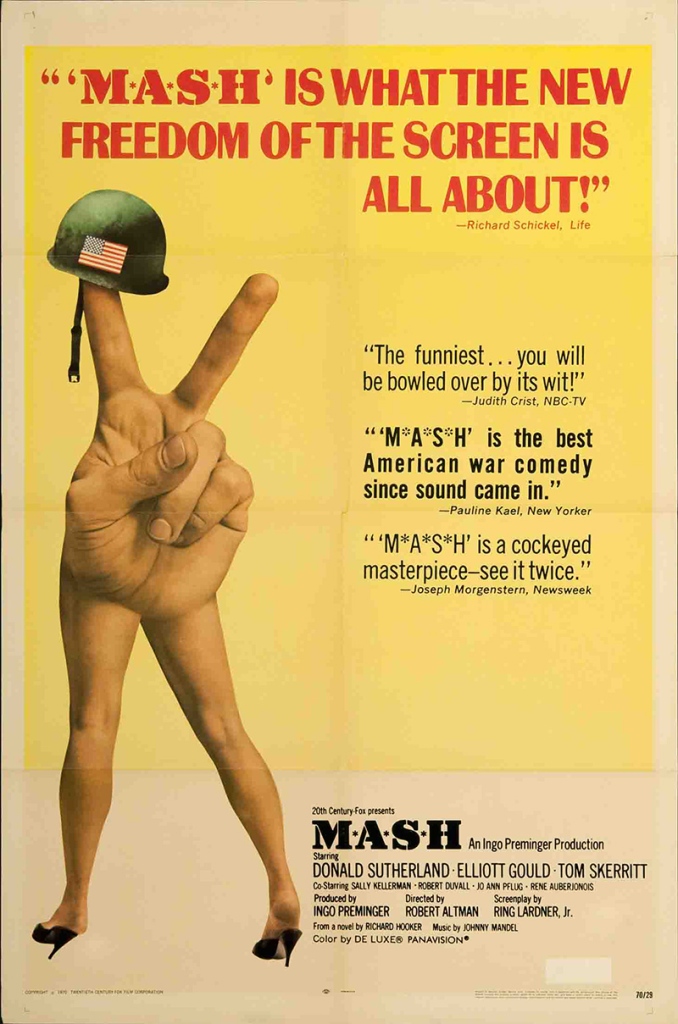
That same year, he directed the off-beat, surrealistic comedy Brewster McCloud (1970) about a reclusive young man (Bud Cort) living in the Huston Astrodome who is fashioning a pair of wings to help him fly.
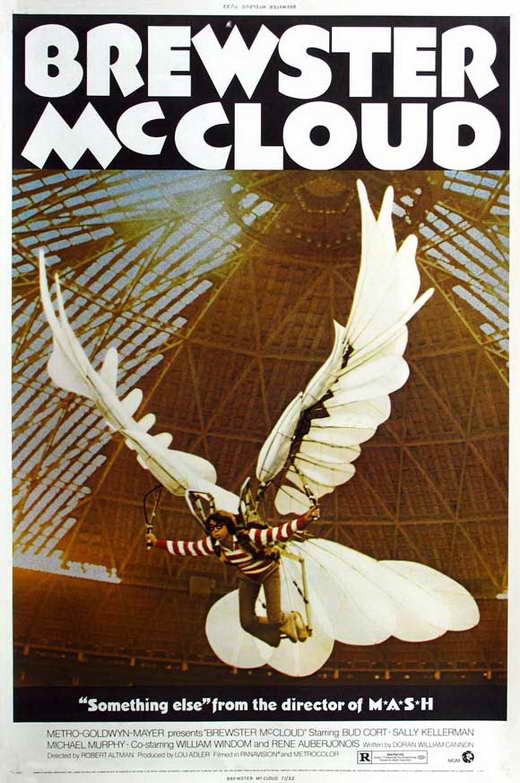
Altman’s next major work was the acclaimed revisionist western McCabe & Mrs. Miller (1971). Set in the late 1800s, a gambler (Warren Beatty) and a prostitute (Julie Christie) run a high-class brothel and experience problems when competitors try to purchase the business. Christie received her second Best Actress Oscar nomination for the movie. The movie was also nominated for a WGA Award for Best Drama Adapted from Another Medium. The film initially received poor reviews upon its release and did not do well at the box office. It achieved critical acclaim and recognition in later years.
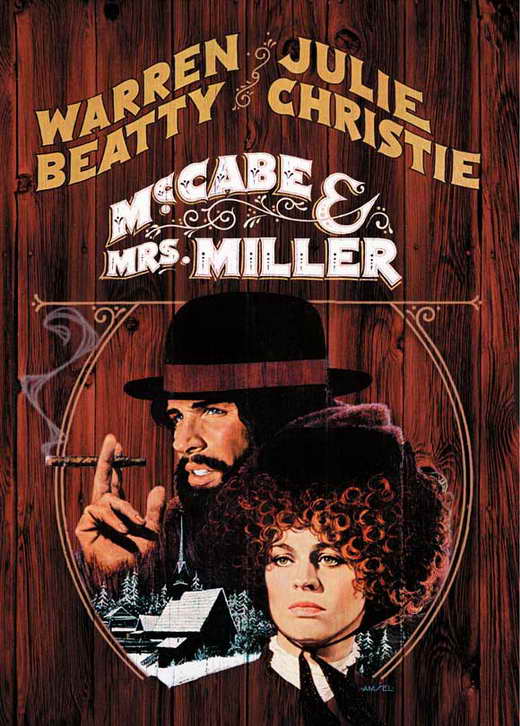
The next year, Altman directed Images (1972) a psychological thriller about a vacationing, mentally unbalanced children’s books author (Susannah York) who becomes increasingly caught up in her delusions and fantasies with dire consequences. Altman was nominated for a Palme d’Or at the Cannes Film Festival and York took home the Best Actress Prize. Altman was also nominated for a WGA award for Best Drama Written Directly for the Screen. The film itself was nominated for a Best English-Language Foreign Film Golden Globe and was nominated for one Academy Award for Best Original Dramatic Score (John Williams).
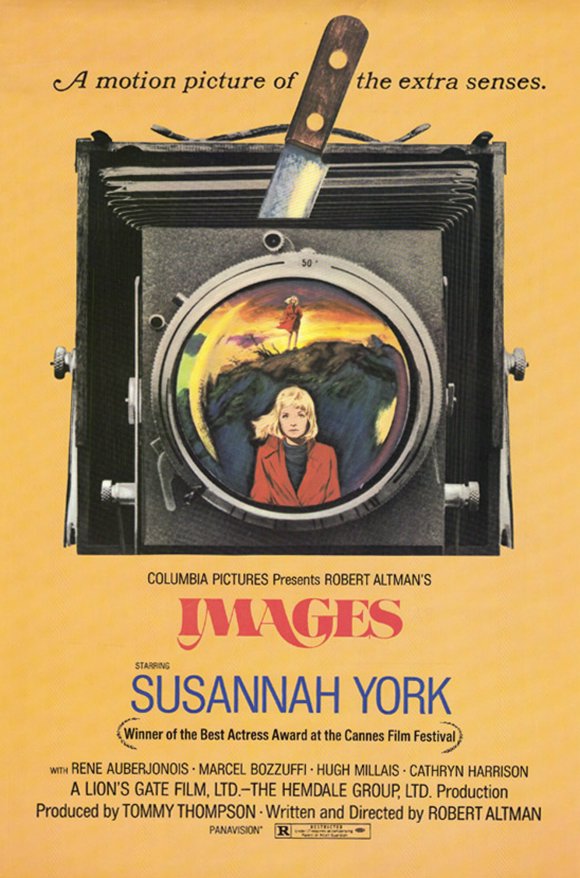
Altman followed that film with the acclaimed, re-fashioned film noir The Long Goodbye (1973) about a private detective (Elliott Gould) who gets involved in a complicated murder investigation after helping a friend flee the country for Mexico.
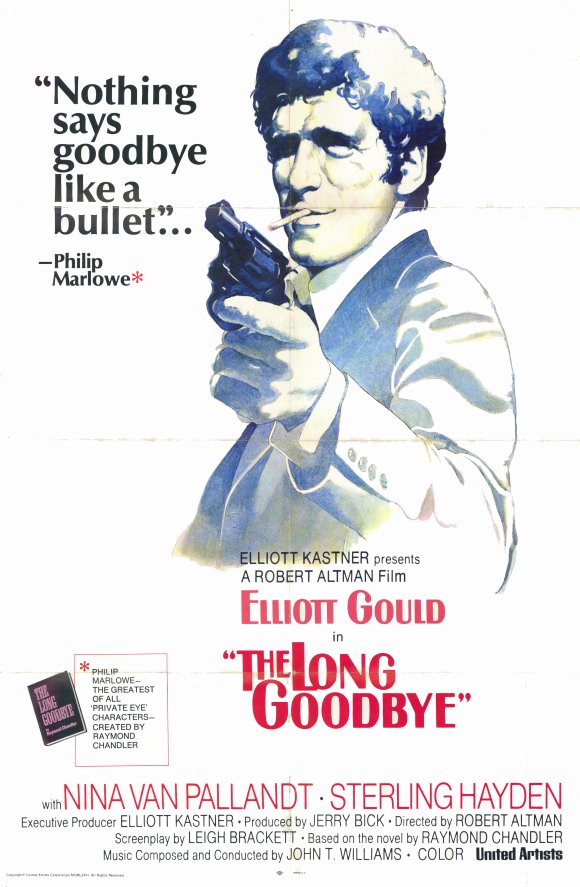
The next year, Altman directed two movies Thieves Like Us (1974) and California Split (1974). A re-imagined, depression-era caper movie, Thieves Like Us tells story of two men (Keith Carradine and John Schuck) who, after escaping from prison, go back to robbing banks with the help of a new accomplice (Bert Remsen). The National Board of Review selected the movie as one of the Top Ten Films of 1974.
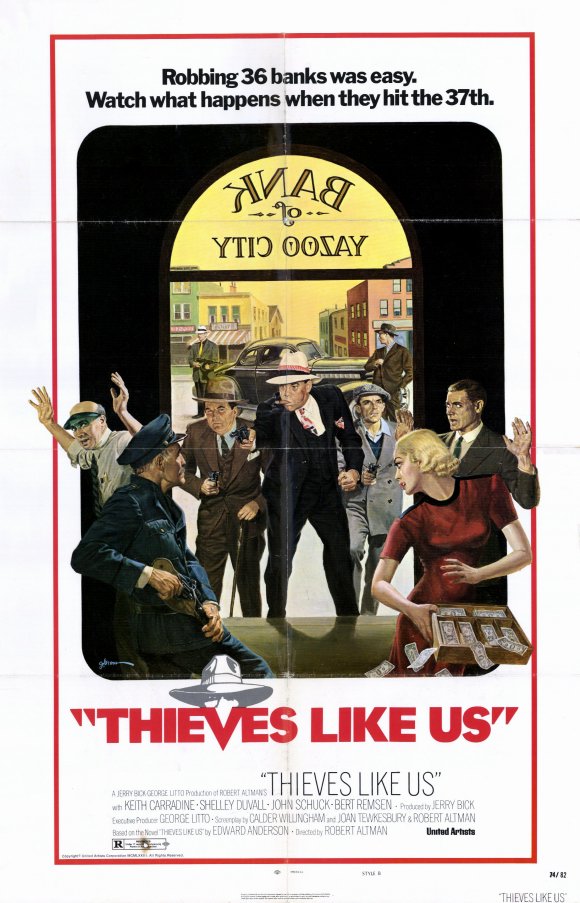
California Split (1974) was a buddy comedy about two gamblers (Elliott Gould and George Segal) who get involved in increasingly dark misadventures as they win and lose large amounts of money together.
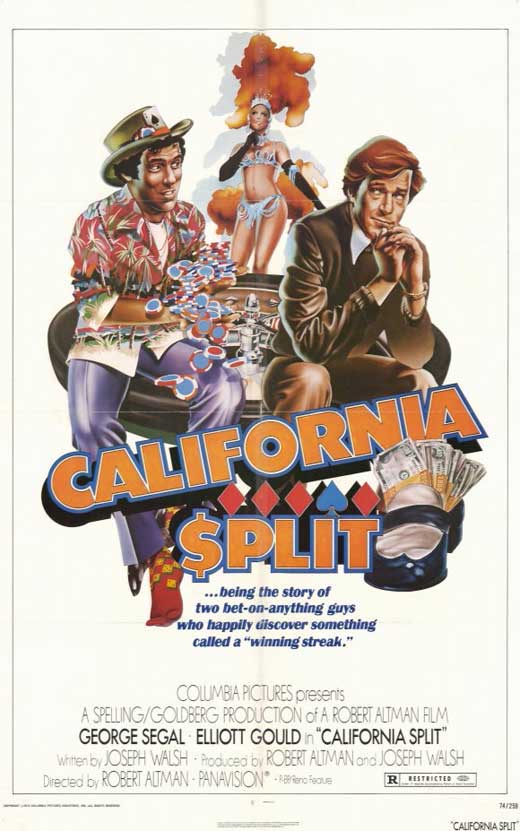
Altman’s next movie Nashville (1975) is considered by many as his masterpiece.It is a dark satirical comedy, which skews the American way of life and its obsessions with fame and commercialism. Shot under 45 days, the film follows multiple storylines featuring various people involved in the country music industry and a political fundraiser. Altman received his second Best Director Oscar nomination for the movie. He was also nominated for a Best Director Golden Globe. The film itself was nominated for five Oscars, including Best Picture and Supporting Actresses (Ronee Blakley & Lily Tomlin) and winning for Best Original Song (I’m Easy). The movie was also nominated for eleven Golden Globes and won for Best Original Song. The film’s other Golden Globe nominations were for Best Motion Picture Drama, Supporting Actor (Henry Gibson), Supporting Actresses (Blakley, Tomlin, Geraldine Chaplin and Barbara Harris), Screenplay and Acting Debuts (Blakley and Tomlin). In addition, the movie was nominated for a WGA Award for Best Drama Written Directly for the Screen and for five Best Actress British Academy of Film and Television Arts (BAFTA) Film Awards.
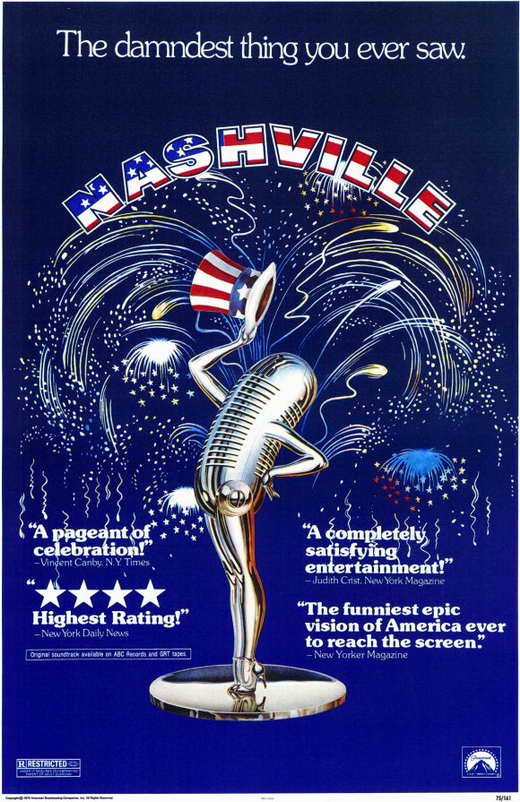
Altman followed the success of Nashville with the satirical, comedic, revisionist western Buffalo Bill and the Indians, or Sitting Bull’s History Lesson (1976) which was poorly received by both critics and audiences. The movie’s story focuses on a fictional account of Buffalo Bill (Paul Newman)’s attempt to enlist Sitting Bull (Frank Kaquitts) to participate in Bill’s Wild West Show, which features negative portrayals of Indigenous Americans. Despite the film’s largely negative reception, the movie won the Golden Bear at the 26th Berlin International Film Festival.
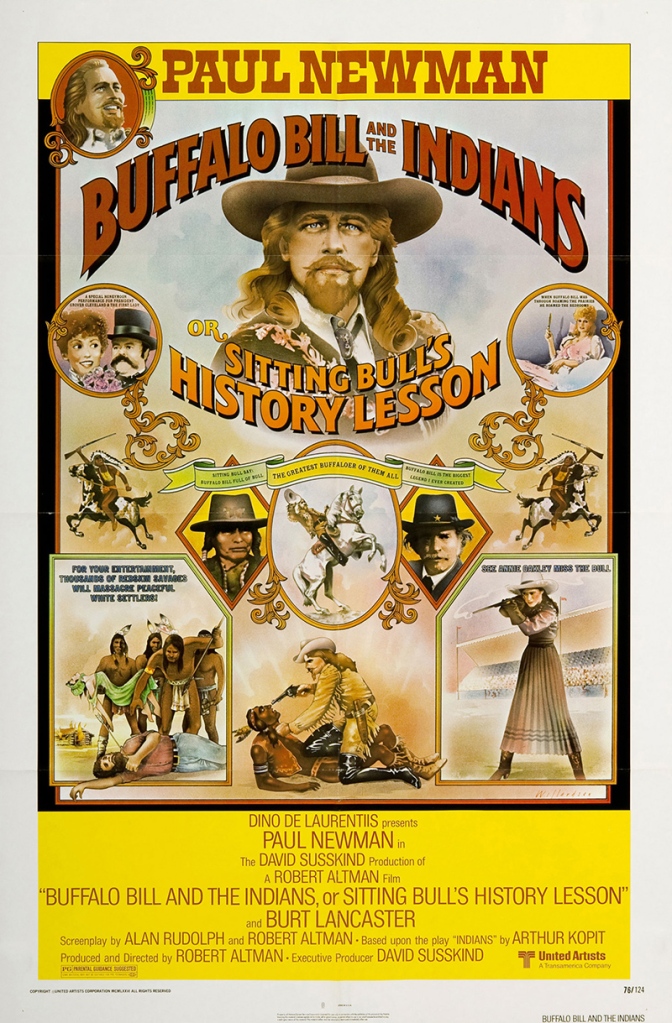
Altman next directed the surrealistic psychological study 3 Women (1977) about two very different physical therapists (Shelley Duvall and Sissy Spacek) who become obsessive friends and roommates in an apartment building owned by an enigmatic pregnant woman (Janice Rule) and her drunken husband. The movie was praised by critics, but did not do well at the box office. Altman was nominated for a Palme d’Or at the Cannes Film Festival and Duvall took home the Best Actress Prize. Duvall was also nominated for a Best Actress British BAFTA Film Award and was awarded Best Actress by the Los Angeles Film Critics Association. Sissy Spacek took home the New York Film Critics Circle Awards Best Supporting Actress award for the movie.
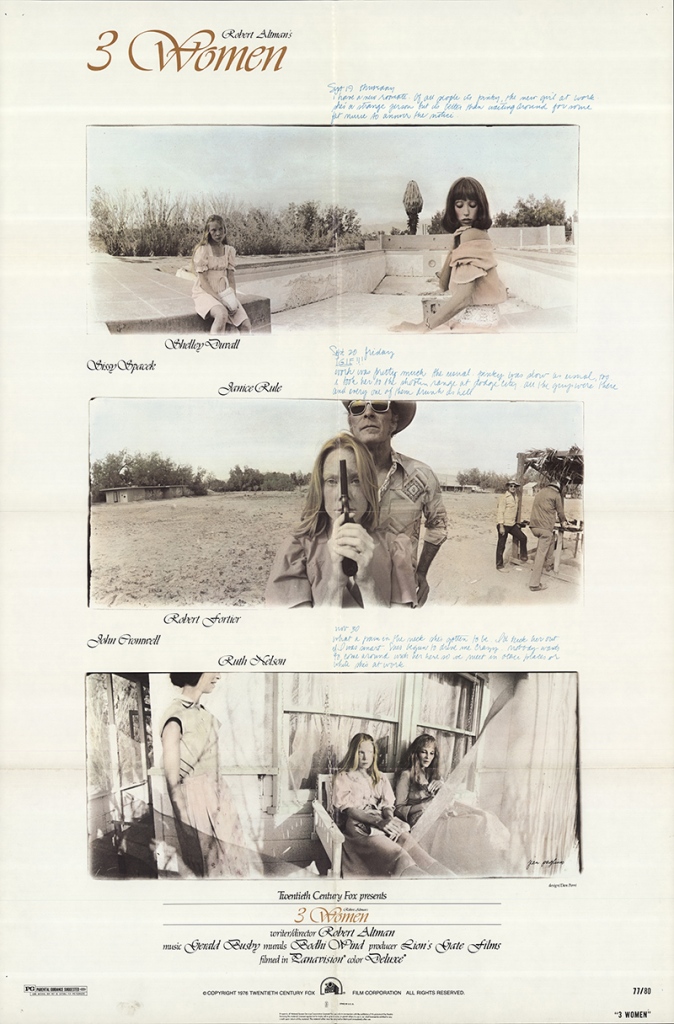
Altman returned to the style of filmmaking he was most famous for in the satirical black comedy A Wedding (1978) with multiple storylines and a large ensemble cast. The story takes place over a single day during the wedding between a young bride (Amy Stryker) from a nouveau riche Kentucky family and the young groom (Desi Arnaz Jr.) from a wealthy Chicago family with suspected ties to the mafia. Altman was nominated for two BAFTA Film Awards for Best Director and Screenplay (sharing the latter nomination with John Considine, Patricia Resnick and Allan F. Nicholls). They also received a WGA nomination for Best Comedy Written Directly for the Screen. In addition, Altman was nominated for France’s César Award for Best Foreign Film. Carol Burnett received a Best Supporting Actress Golden Globes nomination for playing the bride’s mother. The movie marked Lillian Gish’s 100th film.
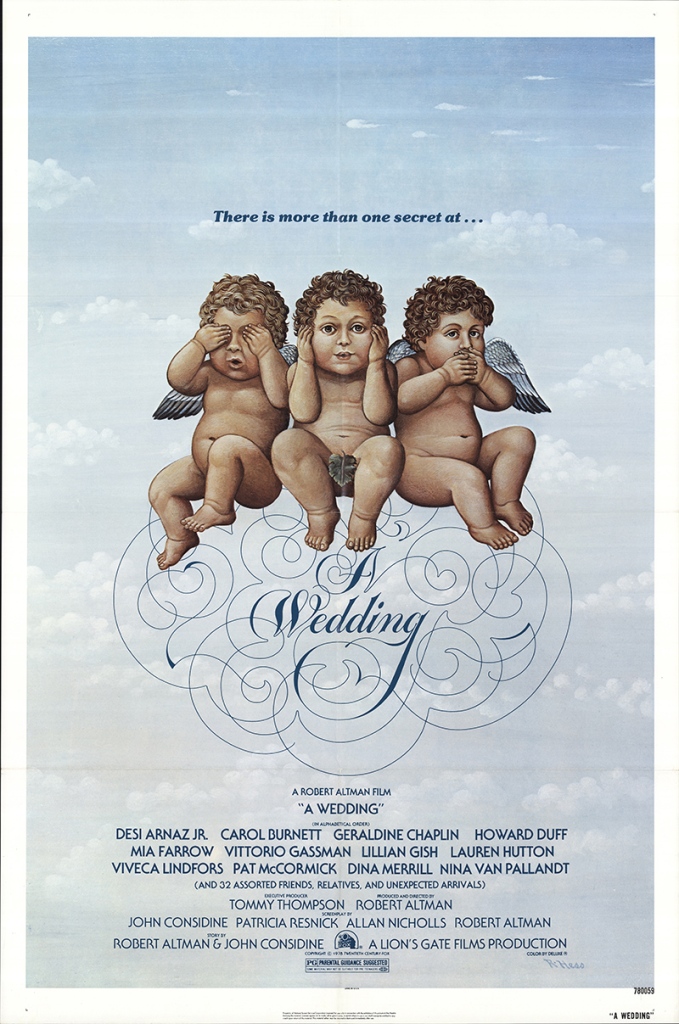
Altman ended the decade with two very different movies: the dystopian science fiction film Quintet (1979) and the romantic comedy A Perfect Couple (1979). The negatively reviewed, box office flop Quintet presented a futuristic, post-apocalyptic vision of the earth during a new ice age where a group of surviving humans is playing a deadly version of a game called ‘Quintet.’
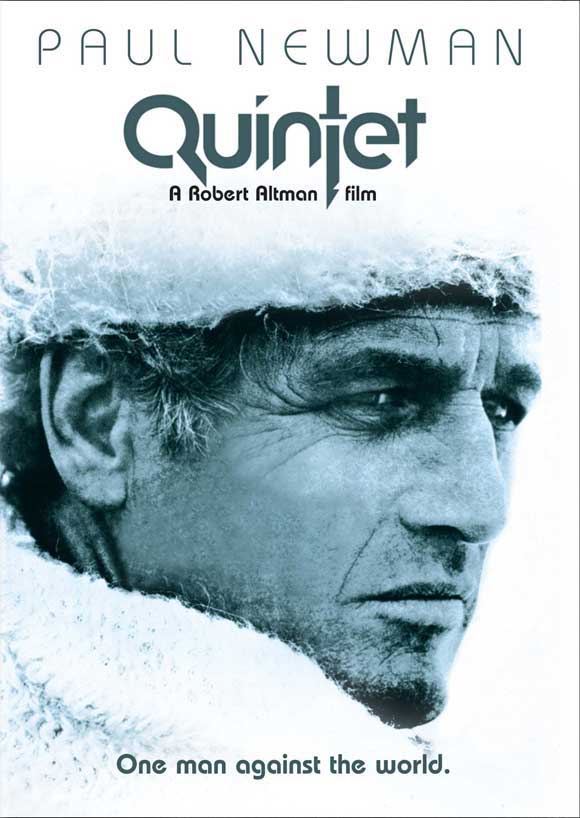
A Perfect Couple was also negatively received by both audiences and critics. The centers on an older, repressed man (Paul Dooley) who is romancing a younger, bohemian musician (Marta Heflin).

Altman worked directing both theatre and motion picture productions in the 1980s. His film work during this decade began with two big budget disasters: the satirical comedy HealtH (1980) and the musical Popeye (1980) with Robin Williams. Later films during this decade included filmed treatments of theatrical productions such as Come Back to the 5 & Dime Jimmy Dean, Jimmy Dean (1982) with Cher, Sandy Dennis and Karen Black, Streamers (1983) with Matthew Modine, Michael Wright and David Alan Grier, and Fool for Love (1985) with Sam Shepard, Kim Basinger, and Harry Dean Stanton. Altman was nominated for his fourth Palme d’Or for Fool for Love.
In the 1990s to the early 2000s, Altman’s filmmaking career had a revival due in particular to three critically acclaimed films: The Player (1992), Short Cuts (1993) and Gosford Park (2001). Altman received Best Director Oscar nominations for all three movies. For The Player, Altman also won a BAFTA for Best Director and was awarded the Best Director prize at the Cannes Film Festival. He was also nominated for a DGA Award and a Golden Globe for Best Director. For Short Cuts, he received a Best Screenplay Golden Globes nomination and won the Film Independent Spirit Award for Best Director. Finally for Gosford Park, he won the Best Director Golden Globe and was nominated for a David Lean Award for Direction at the BAFTAs. Julian Fellowes won the Oscar for Best Original Screenplay for Gosford Park.
Altman’s last film was A Prairie Home Companion (2006) with Lily Tomlin, Meryl Streep and Woody Harrelson.
In his personal life, Altman was married three times and had five children. Robert Altman died on November 20, 2006, at the age of 81 from leukemia.
Altman’s influence on filmmaking continues to be recognized today with his films M*A*S*H (1970), McCabe & Mrs. Miller (1971), The Long Goodbye (1973) and Nashville (1975) being selected for preservation in the United States National Film Registry by the Library of Congress as being “culturally, historically, or aesthetically significant.” The Film Independent’s Robert Altman Award has been awarded to the ensemble cast, director and casting director of independent films since 2009.
~Terry Gale